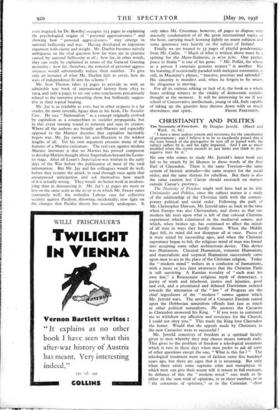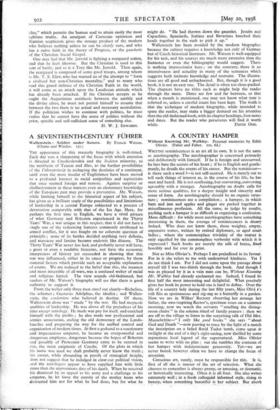CHRISTIANITY AND POLITICS
" I have a most zealous esteem and reverence for the constitution of government ; and I believe it to be so excellently poised that if the least branch of the prerogative be torn off or parted with, the subject suffers by it, and his right impaired. And I am as much troubled when the crown exceeds its just limits and think its pre- rogative hurt by it."
No one who comes to study Mr. Jerrold's latest book can fail to be struck by its likeness to those words of the first Earl of Clarendon. There is the same Toryism—the same system of historic attitudes—the same respect for the social order, and the same distaste for rebellion. But there is also the same caution lest Caesar should encroach on matters outside Caesar's - province.
The Necessity of Freedom might well have had as its title Christianity and Politics, since the subject matter is a study
of the relationship of the Christian faith with the contem- porary.. political and social order. Following the path of Mr. Christopher Dawson, Mr. Jerrold takes us back to the time when Europe was also Christendom, and shows us that our
modern life- rests upon what is left of that colossal Christian experiment Which culminated in the mediaeval summa, and which, when broken up, has continued to affect the Minds of all men in ways they hardly dream. When the Middle
Ages fell, its mind did not disappear all at once. Pieees of it were seized by succeeding ages, and when the Christian supremacy began to fail, the religious mind of man was foreed into accepting some other architectonic device. This device was Humanism. Classical Humanism, romantic Humanism, and materialistic and sceptical Hurnanism: successively 'came upon men to act in the place of the Christian religion. Today the " modern mind " welters in a confusion of humanisms, with a more or less faint awareness that the Christian Faith is still surviving. A Kantian morality of " each man his own laW," a • Rousseauite religious myth of dembcracy, • a parity of truth and falsehood, justice and injustice, good and evil, and a prostituted and debased Darwinism ordered
towards the attestation of the " law " of Progress are the chief ingredients of the " modern '.' summa against which Mr. Jerrold wars. The arrival of a Caesarist Fascism reared upon the Hobbesian naturalism offends him just as much
as other political naturalisms. He answers the Caesarist as Clarendon answered his King. " If you were to command me to withdraw my affection and reverence for the Church, I could not obey you." This made the King love Clarendon
the better. Would that the appeals made by Christians to the new Caesarists were as successful !
Mr. Jerrold conceives of freedom as a spiritual faculty given to men whereby they may choose means towards ends. This gives to the problem of freedom a teleological treatment
which is rare in these days when men prefer to ask all sorts of other questions except the one, " What is this for ? " The teleological treatment went out of fashion some five hundred years ago, but there are signs that it is returning. But only when there exists some supreme ethic and metaphysic to which men can give their assent will it return in full measure. In defiance of this the " modem mind " sees truth to lie
either in-the total of 'opinions, or in sheer number, or in " the. consensus of opinions," or in Cartesian " ekar
idea," which permits the human soul to attain easily the most sublime truths. An amalgam of Cartesian optimism and Kantian scepticism gives the strange product of the modern who believes nothing unless he can be clearly sure, and who has a naive faith in the theory of Progress, or the gaucherie of the Christian Social Gospel.
One may feel that Mr. Jerrold is fighting a rearguard action, and that he feels likewise. But the Christian is used to this sort of battle, and so is a Tory like Mr. Jerrold. Then again, the rearguard is composed of some good troops, among whom is Mr. T. S. Eliot, who has warned us of the attempt to " form a civilised but non-Christian mentality," and to many who read this grand defence of the Christian Faith in the world, it will come as an attack upon the Laodicean attitude which has already been attacked. If the Christian accepts as he ought the Augustinian antithesis between the earthly and the divine cities, he must not permit himself to assume that between the two there is no actual and necessary assimilation. If the politician wishes to continue with politics, he must realise that he cannot have the sense of politics without the prior, specific and self-sufficient sense of something else.
H. W. J. EDWARDS.



















































 Previous page
Previous page